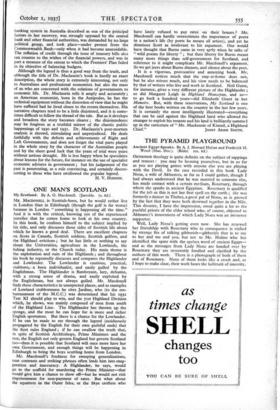AUSTRALIA AND THE DEPRESSION
Economic Planning in Australia 1929-36. By W. R. Maclaurin. (P. S. King. 15s.) AUSTRALIA'S economic revival has taken on something of the character of a legend in English circles. There are many people, knowing little else about the economic condition of the Dominion, who have it as part of their ordinary conversational stock-in-trade that Australia was the first great country to enter the world depression and the first to emerge from it. There are many people, knowing little else about Australia's recovery, who think they know that it was founded upon a concerted and coherent plan in whose construction academic economists played a decisive part. There are others—perhaps also giving way to wishful thinking—who think they know that it was founded upon a sound budgetary policy introduced by the United Australia Party Governments in the Commonwealth and the leading States after the overthrow of Labour. Most legends are untrue, though having a nucleus of truth, and so it is with this particular legend.
There was indeed a deliberate plan at the core of Australia's depression policy—the Premiers' Plan of 1931—and it did indeed owe a great deal, both directly and indirectly, to the counsel of the leading Australian economists. It was not, however, in itself a plan for rescuing Australia from the slump, but a plan for balancing national and State budgets. And it was signed and adopted by Mr. Scullin for the Commonwealth Labour Government, being virulently opposed by at least one of the United Australia Party Ministers now in office at Canberra ; Mr. Lyons himself, then joint leader of the Opposi- tion, was persuaded only very reluctantly to agree to the reduc- tions of bond interest which were its most vital element. The Plan was even signed by Mr. Lang for New South Wales, though he ,afterwards attacked it.
The Premiers' Plan was but one of a series of very loosely connected measures which together—through a fortuitous combination of political and economic circumstances—formed a very successful recipe for economic revival. The to per cent. cut in the federal basic wage (on top of the automatic reductions with the falling cost of living) had been awarded some months previously by a quite independent decision of the Arbitration Court. The depreciation of the Australian pound against sterling, which the recent Royal Commission on the banking system in Australia described as one of the principal factors -in her recovery, was, strongly opposed by the central bank and other financial authorities, was demanded by no large political group, and took place—under protest from the Commonwealth. Bank—only when it had become unavoidable. The reflation of credit through the issue of treasury bills also ran counter to the wishes of the financial powers, and was in part a measure of the extent to which the Premiers' Plan failed in its objective of balancing budgets.
Although the legend is thus a good way from the truth, and although the title• of Dr. Maclaurin's book is hardly an exact description, the whole story is extremely interesting, not only to Australians and professional economists but also the mass of us .who are concerned with. the relations of governments to economic life. Dr. Maclaurin tells it amply and accurately ; an American economist, born in the Antipodes, he has the technical equipment without the distortion of view that he might have suffered had he lived closer to the events themselves. His narrative chapters tend to be a little disjointed, and it is some- times difficult to follow the thread of the tale. But as it develops and broadens the, story becomes clearer ; the disjointedness may be forgiven as a truthful mirror of the chaotic public happenings of 193o and 1931. Dr. Maclaurin's post-mortem analysis is shrewd, stimulating and unprejudiced. He deals faithfully with the defects and achievements of Right and Left Governments, and does not forget the vital parts played in the whole story by the character of the Australian people and by the sheer good luck that the years of trial were years without serious drought. He is less happy when he speculates about lessons for the future, for instance on the use of specialist economic advisers in government ; but his judgement of the past is penetrating, as a rule convincing, and certainly- discon- certing to those who have swallowed the popular legend.
H. V. HonsoN.







































 Previous page
Previous page